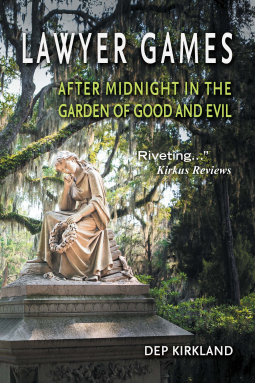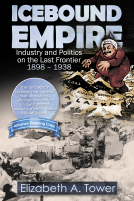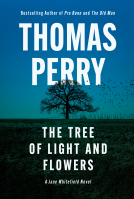
LAWYER GAMES
After Midnight in the Garden of Good and Evil
by DEP KIRKLAND
This title was previously available on NetGalley and is now archived.
Send NetGalley books directly to your Kindle or Kindle app
1
To read on a Kindle or Kindle app, please add kindle@netgalley.com as an approved email address to receive files in your Amazon account. Click here for step-by-step instructions.
2
Also find your Kindle email address within your Amazon account, and enter it here.
Pub Date Oct 08 2015 | Archive Date Jan 29 2016
Description
LAWYER GAMES doesn’t stop with the questions asked by the lawyers but, rather, explains the reason why the question was asked, why another question was not asked, why the question asked was phrased the way it was phrased, and what the lawyer was after, which might or might not have been related to the question’s advertised purpose. This book takes the reader behind the scenes, to dissect the game within the game known as a criminal trial and, in the process, draws startling parallels to the trials of other high-profile criminal defendants such as O.J. Simpson, Angelo Buono, and Phil Spector.
LAWYER GAMES not only proves the guilt of one defendant beyond any shadow of doubt, but also serves as a stinging indictment of the practice of criminal law by a certain species of criminal defense lawyer whose lust for the win trumps all.
LAWYER GAMES goes much further than the boundaries of a single murder case. No one who reads LAWYER GAMES will ever again look the same way at a criminal trial.
A Note From the Publisher
Author is available for interviews, blog tours, autographed book giveaways, contests, and book club discussions.
Advance Praise
shooting death that spawned a best-selling book and movie.
In May 1981, James Williams shot and killed Danny Hansford, purportedly in self-defense. To the initial responders, though, the scene appeared staged. (One of them was Kirkland, who was chief assistant district attorney at the time.) For example, the Luger pistol that Hansford allegedly fired at Williams was under, not in, the deceased’s hand. The state’s case against Williams would go on for years, spawning multiple trials featuring some legal scheming, including surprise witnesses whose testimonies may not have been true. Kirkland pieces together his personal account—he was a part of the prosecution team for the first of four trials—with careful, comprehensive examinations of court documents. His stance is abundantly clear: he believes that Williams was guilty. He isn’t above sardonicism, though; at one point, he suggests that
the circumstances of the defense’s new evidence spelled “F-A-B-R-I-C-A-T-I-O-N in large red letters.” That said, he doesn’t sour his book with constant derision or denunciation. In fact, he typically allows readers to make their own judgments based on the facts, making his points with legal transcripts or testimony summaries. Williams, for example, repeatedly changed his story regarding the night of Hansford’s death; by the third trial, Kirkland simply reminds readers what Williams previously claimed. This nonfiction book often resembles a torrid TV drama as potential witnesses for the prosecution abruptly decide not to testify and more than one conviction is reversed. Other events are outright eerie, such as missing autopsy photos and Williams’ response to Kirkland concerning his imminent arrest: “If I’d wanted to, I could have shot you.” The author rounds out his book with his own scenario of the shooting based on the evidence. He also offers his thoughts on John Berendt’s best-selling book on the crime, Midnight in the Garden of Good and Evil , and Clint Eastwood’s subsequent movie version.
A
meticulous, intuitive, and riveting nonfiction work." -- Kirkus Reviews
Marketing Plan
Dep Kirkland, a third-generation Savannahian, was the Chief Assistant District Attorney for the Eastern Judicial Circuit of Georgia at the time of the shooting death of Danny Hansford and through the first trial of the case of State of Georgia vs. James A. Williams. A graduate of the Career Prosecutor Course of the National District Attorneys’ Association, he was also cross-designated as a federal prosecutor. Thereafter, he served as Director of the Anti-Piracy Task Force of the Satellite Broadcasting & Communications Association of America, as the SBCA General Counsel and Senior Vice President of Operations and, finally, as a legal and political Consultant to The Edison Project.
During his legal career, Dep served as Chairman of the Correctional Facilities & Services Committee of the State Bar of Georgia, as Chairman of the Prison & Jail Subcommittee of the Criminal Justice Section of the American Bar Association and was named a Life Fellow of the Georgia Bar Foundation. Dep was a member of the State Bar of Georgia and the District of Columbia Bar Association and was admitted to practice before the United States Supreme Court as well as various state and federal courts.
Dep left the law altogether some years ago, managing to survive the brief disappointment of his mother—whose bright idea law school was in the first place—and is currently an actor, writer, director and producer residing in Los Angeles by way of New York.
Average rating from 11 members
Featured Reviews
 Eustacia T, Reviewer
Eustacia T, Reviewer
I thought this was going to be my first non-fiction book review of the year, but apparently not! But it's not surprisingly that it's only January and already I'm reading true crime.
Anyway, Lawyer Games is an account of the four trials of The State of Georgia vs James A. Williams (Apparently there's a really famous book called Midnight in the Garden of Good and Evil that was about the same case). It's not really a "did he do it" sort of book, because as the author tells you straight up, he believes that Williams was guilty. What this book is about, are the four trials that eventually ended in a "not-guilty" verdict for the lucky Williams.
Personally, I think the author did a great job with the book. After reading it, I was thoroughly convinced that Williams was guilty and wished that he didn't eventually go free (even if for a few months). This is despite the reminder I got at the start of the book that the author was biased - I really liked that too, by the way. I like it when an author states his bias upfront, instead of spinning his angle as the truth.
The book itself is divided into a succession of very short chapters (think about 10 pages on the iPad), followed by one extremely long chapter. That extremely long chapter is probably the chapter that goes over all the evidence and testimony in the trial. What that meant for me was that I was happily reading along, thinking "Hey, this book isn't that bad", then WHAM, a long, long chapter for me to dig through. I suppose I wouldn't have minded it much if I wasn't reading it in the train (and had to stop halfway), but I did, so it was a little annoying.
As for the narrative style, the book is definitely not casual. While the author can be sarcastic at times, there is this sense of formality throughout the book. Perhaps it's due to the author's background in the law?
At any rate, this was an interesting book. Like I said earlier, it's not really about truth/who the real murderer is. It's about how expensive lawyers who are willing to do anything can drag out a trial long enough.
Disclaimer: I got a free copy of this book from the publisher via NetGalley in exchange for a free and honest review.
Readers who liked this book also liked:
Marie Bostwick
Historical Fiction, Literary Fiction, Women's Fiction
Jennie Garth
Biographies & Memoirs, Parenting, Families, Relationships, Religion & Spirituality


















